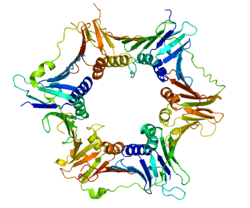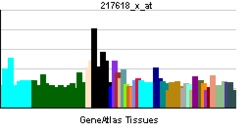HUS1
| View/Edit Human | View/Edit Mouse |
Checkpoint protein HUS1 is a protein that in humans is encoded by the HUS1 gene.[3][4]
Function
The protein encoded by this gene is a component of an evolutionarily conserved, genotoxin-activated checkpoint complex that is involved in the cell cycle arrest in response to DNA damage. This protein forms a heterotrimeric complex with checkpoint proteins RAD9 and RAD1. In response to DNA damage, the trimeric complex interacts with another protein complex consisting of checkpoint protein RAD17 and four small subunits of the replication factor C (RFC), which loads the combined complex onto the chromatin. The DNA damage induced chromatin binding has been shown to depend on the activation of the checkpoint kinase ATM, and is thought to be an early checkpoint signaling event.[5]
Interactions
HUS1 has been shown to interact with:
References
- ↑ "Human PubMed Reference:".
- ↑ "Mouse PubMed Reference:".
- ↑ Dean FB, Lian L, O'Donnell M (Dec 1998). "cDNA cloning and gene mapping of human homologs for Schizosaccharomyces pombe rad17, rad1, and hus1 and cloning of homologs from mouse, Caenorhabditis elegans, and Drosophila melanogaster". Genomics. 54 (3): 424–36. doi:10.1006/geno.1998.5587. PMID 9878245.
- ↑ Kostrub CF, Knudsen K, Subramani S, Enoch T (Apr 1998). "Hus1p, a conserved fission yeast checkpoint protein, interacts with Rad1p and is phosphorylated in response to DNA damage". The EMBO Journal. 17 (7): 2055–66. doi:10.1093/emboj/17.7.2055. PMC 1170550
 . PMID 9524127.
. PMID 9524127. - ↑ "Entrez Gene: HUS1 HUS1 checkpoint homolog (S. pombe)".
- ↑ Cai RL, Yan-Neale Y, Cueto MA, Xu H, Cohen D (Sep 2000). "HDAC1, a histone deacetylase, forms a complex with Hus1 and Rad9, two G2/M checkpoint Rad proteins". The Journal of Biological Chemistry. 275 (36): 27909–16. doi:10.1074/jbc.M000168200. PMID 10846170.
- ↑ Komatsu K, Wharton W, Hang H, Wu C, Singh S, Lieberman HB, Pledger WJ, Wang HG (Nov 2000). "PCNA interacts with hHus1/hRad9 in response to DNA damage and replication inhibition". Oncogene. 19 (46): 5291–7. doi:10.1038/sj.onc.1203901. PMID 11077446.
- 1 2 Volkmer E, Karnitz LM (Jan 1999). "Human homologs of Schizosaccharomyces pombe rad1, hus1, and rad9 form a DNA damage-responsive protein complex". The Journal of Biological Chemistry. 274 (2): 567–70. doi:10.1074/jbc.274.2.567. PMID 9872989.
- ↑ Hang H, Zhang Y, Dunbrack RL, Wang C, Lieberman HB (Apr 2002). "Identification and characterization of a paralog of human cell cycle checkpoint gene HUS1". Genomics. 79 (4): 487–92. doi:10.1006/geno.2002.6737. PMID 11944979.
- ↑ Bermudez VP, Lindsey-Boltz LA, Cesare AJ, Maniwa Y, Griffith JD, Hurwitz J, Sancar A (Feb 2003). "Loading of the human 9-1-1 checkpoint complex onto DNA by the checkpoint clamp loader hRad17-replication factor C complex in vitro". Proceedings of the National Academy of Sciences of the United States of America. 100 (4): 1633–8. doi:10.1073/pnas.0437927100. PMC 149884
 . PMID 12578958.
. PMID 12578958. - ↑ Rauen M, Burtelow MA, Dufault VM, Karnitz LM (Sep 2000). "The human checkpoint protein hRad17 interacts with the PCNA-like proteins hRad1, hHus1, and hRad9". The Journal of Biological Chemistry. 275 (38): 29767–71. doi:10.1074/jbc.M005782200. PMID 10884395.
- ↑ Dufault VM, Oestreich AJ, Vroman BT, Karnitz LM (Dec 2003). "Identification and characterization of RAD9B, a paralog of the RAD9 checkpoint gene". Genomics. 82 (6): 644–51. doi:10.1016/s0888-7543(03)00200-3. PMID 14611806.
- ↑ Griffith JD, Lindsey-Boltz LA, Sancar A (May 2002). "Structures of the human Rad17-replication factor C and checkpoint Rad 9-1-1 complexes visualized by glycerol spray/low voltage microscopy". The Journal of Biological Chemistry. 277 (18): 15233–6. doi:10.1074/jbc.C200129200. PMID 11907025.
- ↑ Hirai I, Wang HG (Jul 2002). "A role of the C-terminal region of human Rad9 (hRad9) in nuclear transport of the hRad9 checkpoint complex". The Journal of Biological Chemistry. 277 (28): 25722–7. doi:10.1074/jbc.M203079200. PMID 11994305.
Further reading
- Dominguez O, Ashhab Y, Sabater L, Belloso E, Caro P, Pujol-Borrell R (Dec 1998). "Cloning of ARE-containing genes by AU-motif-directed display". Genomics. 54 (2): 278–86. doi:10.1006/geno.1998.5548. PMID 9828130.
- Volkmer E, Karnitz LM (Jan 1999). "Human homologs of Schizosaccharomyces pombe rad1, hus1, and rad9 form a DNA damage-responsive protein complex". The Journal of Biological Chemistry. 274 (2): 567–70. doi:10.1074/jbc.274.2.567. PMID 9872989.
- St Onge RP, Udell CM, Casselman R, Davey S (Jun 1999). "The human G2 checkpoint control protein hRAD9 is a nuclear phosphoprotein that forms complexes with hRAD1 and hHUS1". Molecular Biology of the Cell. 10 (6): 1985–95. doi:10.1091/mbc.10.6.1985. PMC 25401
 . PMID 10359610.
. PMID 10359610. - Hang H, Lieberman HB (Apr 2000). "Physical interactions among human checkpoint control proteins HUS1p, RAD1p, and RAD9p, and implications for the regulation of cell cycle progression". Genomics. 65 (1): 24–33. doi:10.1006/geno.2000.6142. PMID 10777662.
- Cai RL, Yan-Neale Y, Cueto MA, Xu H, Cohen D (Sep 2000). "HDAC1, a histone deacetylase, forms a complex with Hus1 and Rad9, two G2/M checkpoint Rad proteins". The Journal of Biological Chemistry. 275 (36): 27909–16. doi:10.1074/jbc.M000168200. PMID 10846170.
- Burtelow MA, Kaufmann SH, Karnitz LM (Aug 2000). "Retention of the human Rad9 checkpoint complex in extraction-resistant nuclear complexes after DNA damage". The Journal of Biological Chemistry. 275 (34): 26343–8. doi:10.1074/jbc.M001244200. PMID 10852904.
- Rauen M, Burtelow MA, Dufault VM, Karnitz LM (Sep 2000). "The human checkpoint protein hRad17 interacts with the PCNA-like proteins hRad1, hHus1, and hRad9". The Journal of Biological Chemistry. 275 (38): 29767–71. doi:10.1074/jbc.M005782200. PMID 10884395.
- Komatsu K, Wharton W, Hang H, Wu C, Singh S, Lieberman HB, Pledger WJ, Wang HG (Nov 2000). "PCNA interacts with hHus1/hRad9 in response to DNA damage and replication inhibition". Oncogene. 19 (46): 5291–7. doi:10.1038/sj.onc.1203901. PMID 11077446.
- Xiang SL, Kumano T, Iwasaki SI, Sun X, Yoshioka K, Yamamoto KC (Oct 2001). "The J domain of Tpr2 regulates its interaction with the proapoptotic and cell-cycle checkpoint protein, Rad9". Biochemical and Biophysical Research Communications. 287 (4): 932–40. doi:10.1006/bbrc.2001.5685. PMID 11573955.
- Griffith JD, Lindsey-Boltz LA, Sancar A (May 2002). "Structures of the human Rad17-replication factor C and checkpoint Rad 9-1-1 complexes visualized by glycerol spray/low voltage microscopy". The Journal of Biological Chemistry. 277 (18): 15233–6. doi:10.1074/jbc.C200129200. PMID 11907025.
- Kinzel B, Hall J, Natt F, Weiler J, Cohen D (Mar 2002). "Downregulation of Hus1 by antisense oligonucleotides enhances the sensitivity of human lung carcinoma cells to cisplatin". Cancer. 94 (6): 1808–14. doi:10.1002/cncr.10383. PMID 11920544.
- Hang H, Zhang Y, Dunbrack RL, Wang C, Lieberman HB (Apr 2002). "Identification and characterization of a paralog of human cell cycle checkpoint gene HUS1". Genomics. 79 (4): 487–92. doi:10.1006/geno.2002.6737. PMID 11944979.
- Roos-Mattjus P, Vroman BT, Burtelow MA, Rauen M, Eapen AK, Karnitz LM (Nov 2002). "Genotoxin-induced Rad9-Hus1-Rad1 (9-1-1) chromatin association is an early checkpoint signaling event". The Journal of Biological Chemistry. 277 (46): 43809–12. doi:10.1074/jbc.M207272200. PMID 12228248.
- Bermudez VP, Lindsey-Boltz LA, Cesare AJ, Maniwa Y, Griffith JD, Hurwitz J, Sancar A (Feb 2003). "Loading of the human 9-1-1 checkpoint complex onto DNA by the checkpoint clamp loader hRad17-replication factor C complex in vitro". Proceedings of the National Academy of Sciences of the United States of America. 100 (4): 1633–8. doi:10.1073/pnas.0437927100. PMC 149884
 . PMID 12578958.
. PMID 12578958. - Hopkins KM, Wang X, Berlin A, Hang H, Thaker HM, Lieberman HB (Sep 2003). "Expression of mammalian paralogues of HRAD9 and Mrad9 checkpoint control genes in normal and cancerous testicular tissue". Cancer Research. 63 (17): 5291–8. PMID 14500360.
- Dufault VM, Oestreich AJ, Vroman BT, Karnitz LM (Dec 2003). "Identification and characterization of RAD9B, a paralog of the RAD9 checkpoint gene". Genomics. 82 (6): 644–51. doi:10.1016/S0888-7543(03)00200-3. PMID 14611806.



